SRS giant storage unit okayed for start

The Department of Energy’s Office of Environmental Management has authorized the newest megavolume disposal unit to begin operating at the Savannah River Site in South Carolina.

A message from NV5, Inc.
Seconds Matter: Rethinking Nuclear Facility Security for the Modern Threat Landscape

The Department of Energy’s Office of Environmental Management has authorized the newest megavolume disposal unit to begin operating at the Savannah River Site in South Carolina.
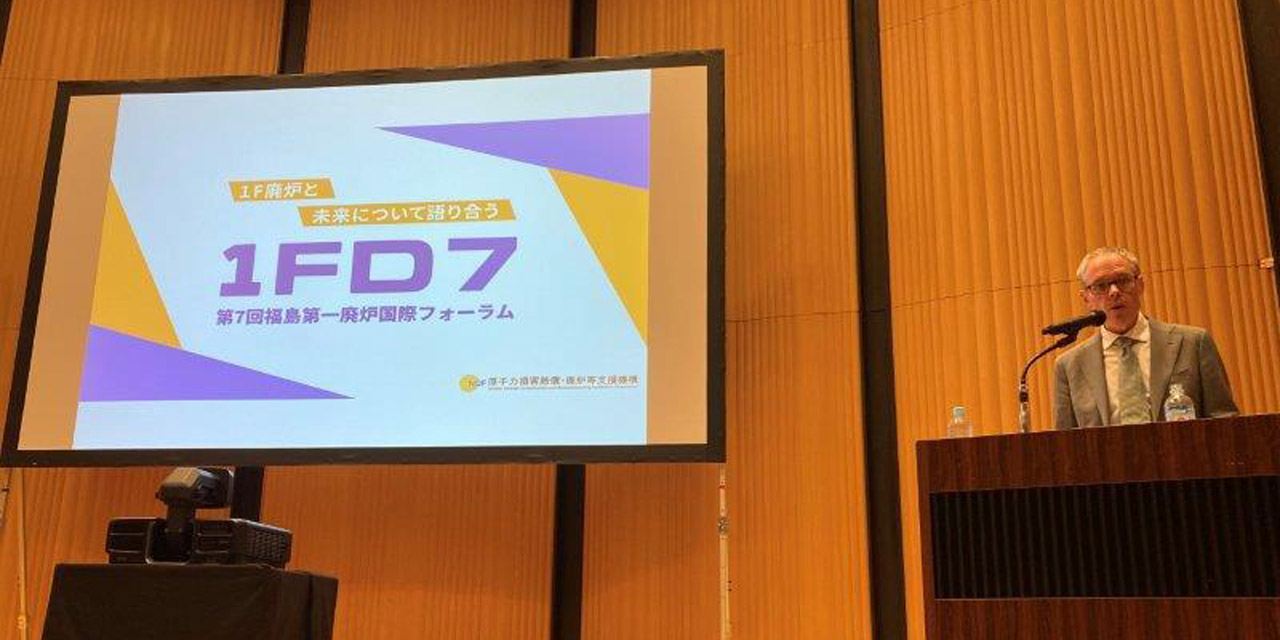
Senior advisor Ike White and others with the Department of Energy’s Office of Environmental Management traveled to Japan this week to attend the 7th International Forum on the Decommissioning of the Fukushima Daiichi Nuclear Power Station.

More than 300 employees from the Department of Energy's Office of Environmental Management (EM) have recently retired, resulting in a large amount of job vacancies across the cleanup program, according to the DOE.
EM’s Workforce Management Office is implementing recruitment efforts to fill the vacancies with college graduates, early career professionals, mid-career candidates, and seasoned veterans.
According to the DOE, "The open positions offer opportunities across many different disciplines, including engineering, science, business, management, safety and information technology."
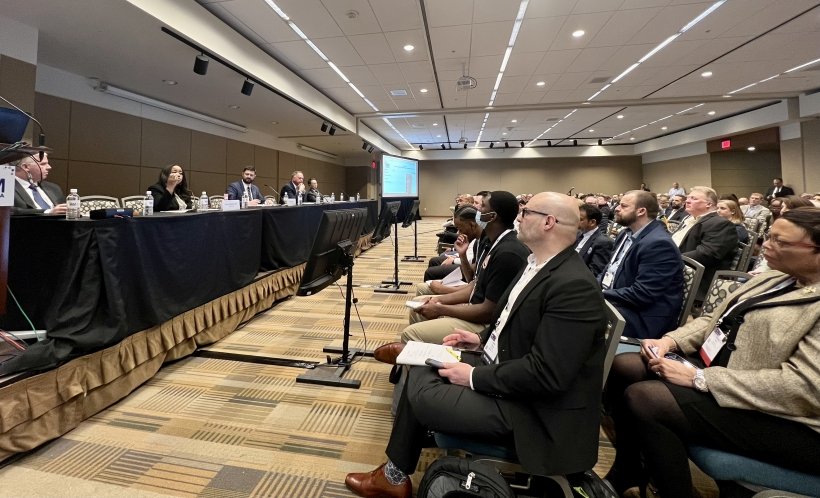
The Department of Energy’s Office of Environmental Management (EM) has made great progress in accomplishing its cleanup of legacy radioactive waste but has yet to tackle its most challenging tasks, including the treatment of liquid tank waste at the Hanford, Idaho, and Savannah River sites. That was the consensus of the DOE-EM officials who took part in a panel session of the 2023 Waste Management Symposia, held February 26–March 2 in Phoenix, Ariz.
Attracting more than 2,000 attendees, the 2023 Waste Management Symposia was held February 26–March 2 in Phoenix, Ariz. For many, this year’s conference was a return to business as usual, with a packed exhibit hall and well-attended technical session, as the upheaval brought about by the pandemic that began three years earlier seemed a thing of the pasts. Not that those who gathered in Phoenix threw any caution to the unseasonably cold and rainy winds that descended across Arizona this year.
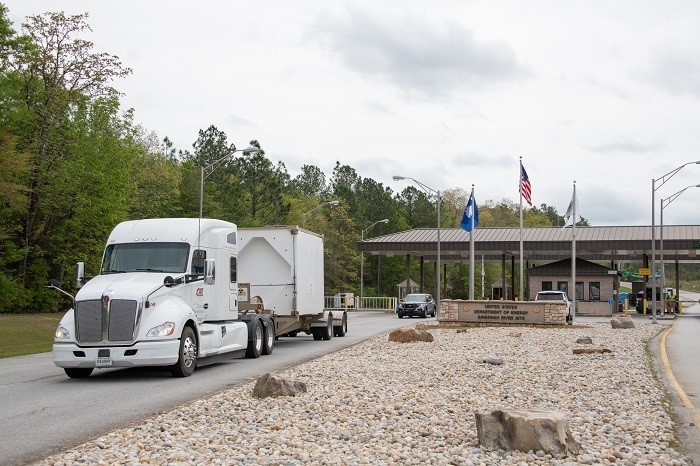
The Department of Energy reported this month that the final container of legacy transuranic waste from the Savannah River Site arrived at the Waste Isolation Pilot Plant for permanent disposal on the afternoon of April 14. The shipment capped the end of a journey for 239 shipments that began in 2011.
In all, trucks that carried the shipments weighed a combined 11,402,000 pounds and travelled more than 347,000 miles to the WIPP site.
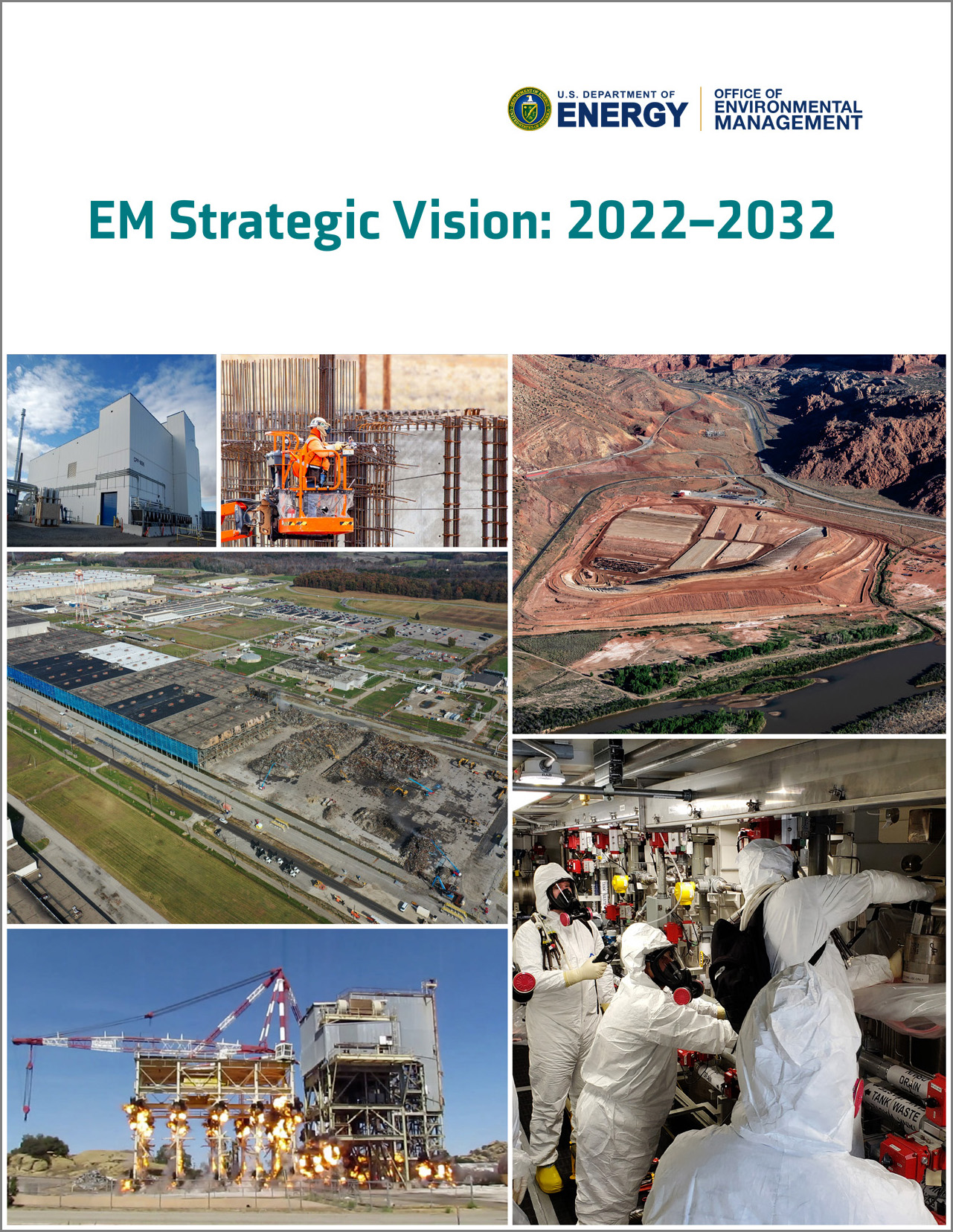 The Department of Energy’s Office of Environmental Management (EM) has issued EM Strategic Vision 2022-2032, a blueprint for planned nuclear-related cleanup efforts over the next decade. The document outlines environmental cleanup priorities for 2022–2032, focusing on safety, innovation, and improved performance.
The Department of Energy’s Office of Environmental Management (EM) has issued EM Strategic Vision 2022-2032, a blueprint for planned nuclear-related cleanup efforts over the next decade. The document outlines environmental cleanup priorities for 2022–2032, focusing on safety, innovation, and improved performance.
According to a March 8 statement, the DOE is working to fulfill “the moral and ecological responsibility of safely dealing with contamination and delivering on environmental justice goals in communities that were vital to the development of nuclear weapons and advances in government-sponsored nuclear energy research.”
EM Strategic Vision 2022–2032, which is available here, is an update of previous iterations and was developed with feedback from regulators, tribal nations, local communities, and other partners.
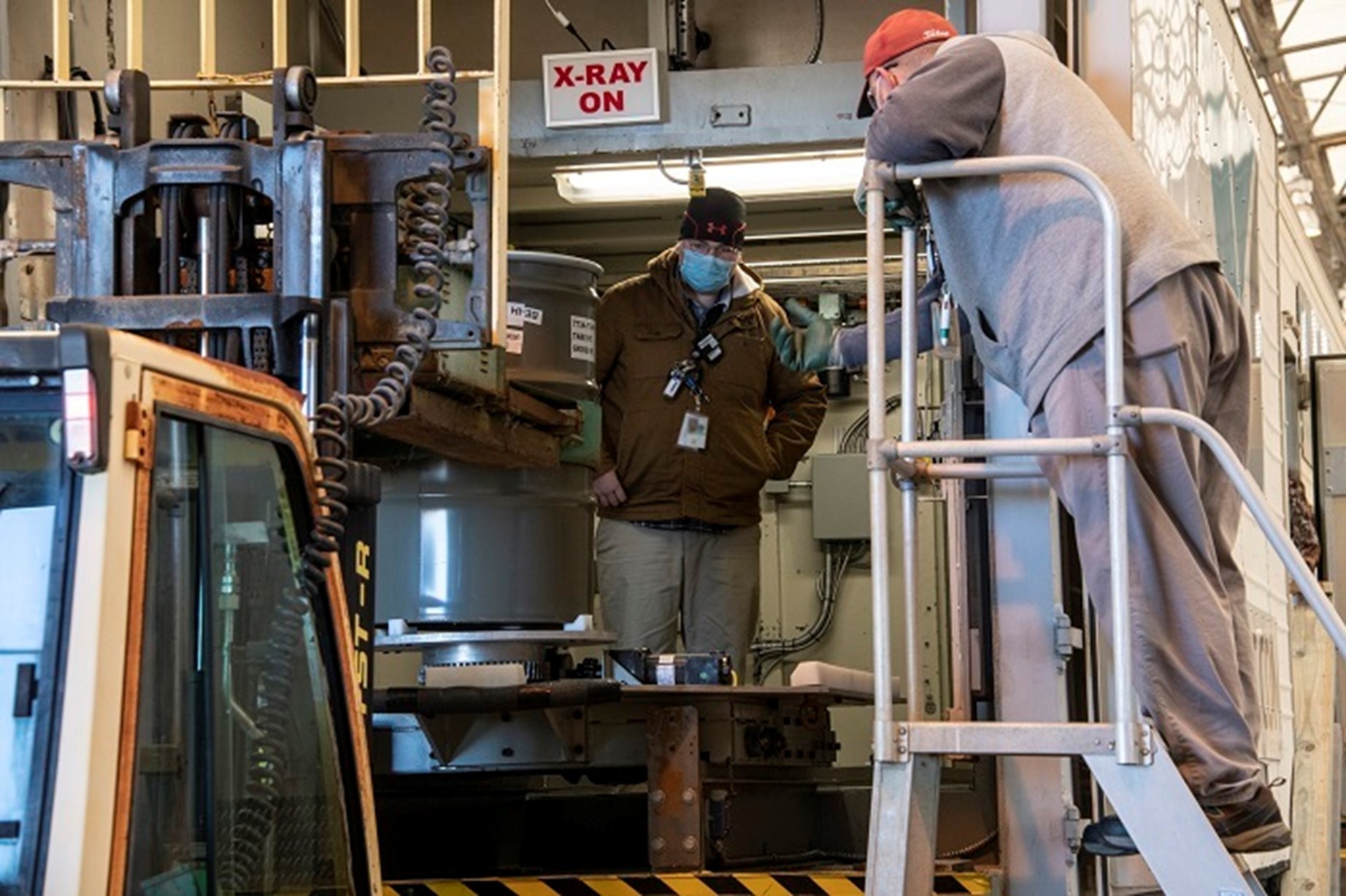
Operators at the Savannah River Site’s Solid Waste Management Facility can now characterize and certify newly generated TRU waste through the use of a real-time radiography unit that uses an X-ray system to examine the contents of waste containers. The equipment was recently installed to meet updated requirements set by the Department of Energy’s National TRU Program that involve evaluating the containers for chemical compatibility and oxidizing chemicals.
The shipments of TRU waste from SRS, in South Carolina, are sent to the Waste Isolation Pilot Plant (WIPP), in New Mexico, for disposal.

To protect a treasured ecological species of northern New Mexico, the Los Alamos Field Office (EM-LA) of the Department of Energy’s Office of Environmental Management and its contractor N3B this month began their annual task of modifying legacy waste cleanup activities at Los Alamos National Laboratory ahead of the Mexican spotted owl breeding season.
The U.S. Fish and Wildlife Service (USFWS) listed the owl as a threatened species in 1993, when population numbers were decreasing drastically due to the loss, degradation, and fragmentation of their habitat.
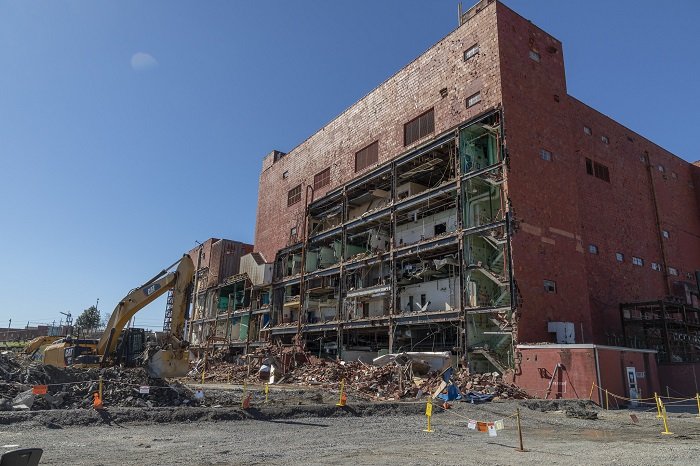
Workers with the Department of Energy’s Office of Environmental Management (EM) recently began demolishing the last facility standing in the former Biology Complex at the Y-12 National Security Complex at the Oak Ridge Reservation in Tennessee.
As announced by EM on March 23, removal of the massive six-story, 255,000-square-foot Building 9207 creates a new chapter of transformation and modernization for Y-12. Completion of the Biology Complex demolition is one of EM’s 2021 priorities.
According to EM, the facilities in the Biology Complex presented significant structural risks due to their deterioration, and their condition landed them on DOE’s list of high-risk excess contaminated facilities.
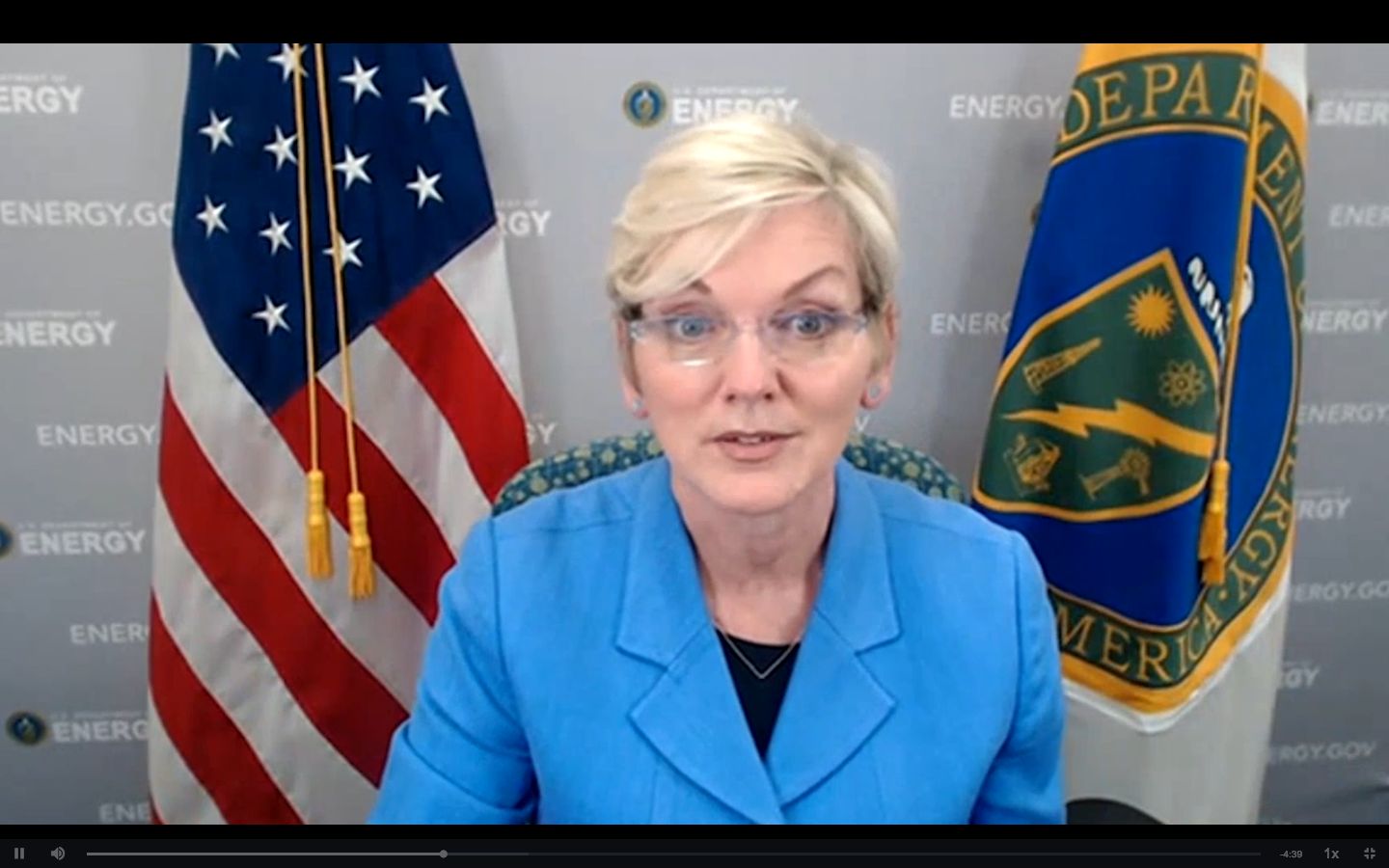
Secretary Granholm during a live stream of the 2021 Waste Management Symposia.
Newly appointed Energy Secretary Jennifer Granholm promised a more “collaborative and inclusive approach” to working with communities hosting and surrounding Department of Energy cleanup sites during a video address to the 2021 Waste Management Symposia on March 9. Granholm is the highest DOE official to ever address the annual conference dedicated to radioactive waste management, which is being held virtually this year due to the ongoing pandemic.
“Our work is about more than just restoring the land,” Granholm said of the DOE’s environmental management program. “It is really about keeping our promises to the American people. It is our responsibility to lift this burden from communities that have shouldered the burden of our safety and help them achieve a more vibrant and sustainable future.”

William “Ike” White, the DOE's acting assistant secretary for Environmental Management. Source: DOE
William “Ike” White, the Department of Energy’s acting assistant secretary for environmental management, helped open the 2021 Waste Management Symposia by announcing a new era for the department’s Office of Environmental Management (EM) and its cleanup mission. Speaking via live stream during the virtual meeting’s plenary session on March 8, White said, “Today, EM is at the start of a new era, with a new administration and a new set of priorities for the year, and, hopefully, the start of a new post-pandemic world.”
The new priorities that White touted are contained in EM’s Calendar Year 2021 Mission and Priorities, which outlines specific planned goals across the cleanup complex for the coming year. According to the DOE, the calendar serves as a marker for EM’s continuing success in addressing the legacy of nuclear weapons production and government-sponsored nuclear energy research.
An aerial view of the Salt Waste Processing Facility at SRS. Photo: DOE
The hot commissioning testing phase of operations at the Salt Waste Processing Facility (SWPF) has been completed, signaling the facility’s entrance into fully integrated operations with the other liquid waste facilities at the Department of Energy’s Savannah River Site in South Carolina.
Radiation shielding, environmental emissions, and product waste acceptance requirements were all tested and validated during the commissioning phase of the SWPF, the DOE announced on January 19. The SWPF will treat the approximately 31 million gallons of remaining salt waste currently stored in underground tanks at SRS.
Parsons Corporation, the contractor that designed and built the first-of-a-kind facility, will operate the SWPF for one year, beginning this month. It is anticipated that the facility will process up to 6 million gallons of waste during the first year of operations.
A fissile material handler uses a shielded glovebox to dissolve U-233 into a low-level form so that it can be mixed with grout for safe transportation and disposal. Photo: DOE
The processing and downblending of uranium-233 for disposal has resumed at Oak Ridge National Laboratory, following a pause in operations due to the COVID-19 pandemic, the Department of Energy announced on October 20. Removal and disposition of the U-233 is one of the DOE Office of Environmental Management’s highest priorities at the site, as stated in its strategic vision released earlier this year.
The project is removing a significant risk by eliminating the inventory of highly enriched fissile material stored in Building 3019, the world’s oldest operating nuclear facility, according to the DOE. Employees, known as fissile material handlers, use shielded gloveboxes to dissolve U-233 into a low-level form so that it can be mixed with grout for safe transportation and disposal. The material dates back decades and was originally pursued as a fuel for reactors; however, it did not prove to be a viable option.
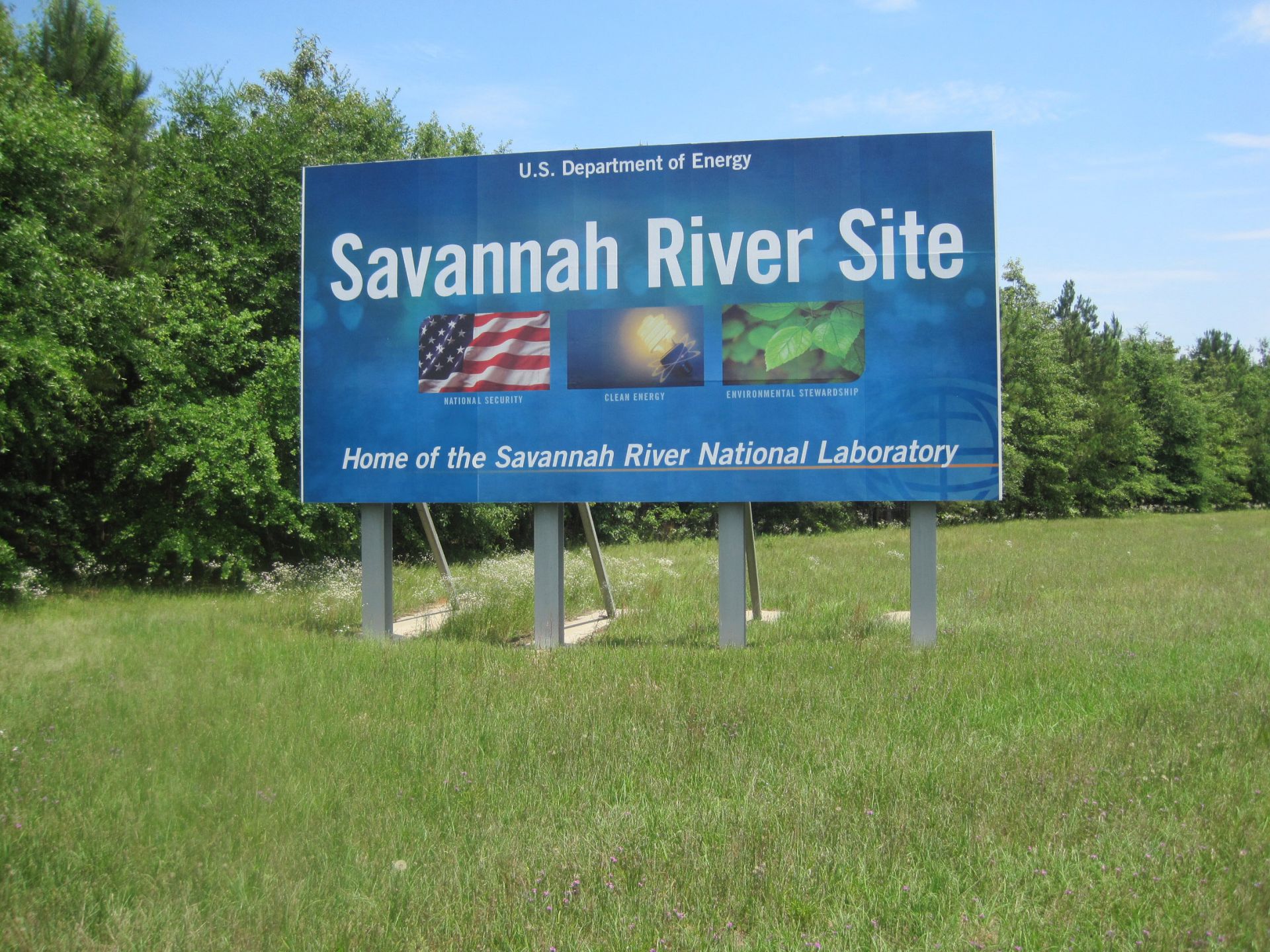
Savannah River’s integrated mission contract will combine liquid waste work with nuclear materials management.
The Department of Energy’s Office of Environmental Management (EM) has begun accepting bids on a new 10-year, $21-billion contract for the Savannah River Site in South Carolina. EM issued a final request for proposal for the SRS integrated mission completion contract (IMCC) on October 1, posting it to EM’s dedicated SRS IMCC website.
The IMCC would coalesce the work of two current contractors, including Savannah River Remediation, the site’s liquid waste contractor led by Amentum with partners Bechtel National, Jacobs, and BWX Technologies, into a single contract, combining liquid waste work with nuclear materials management.
The deadline for proposals for the site contract is December 1.
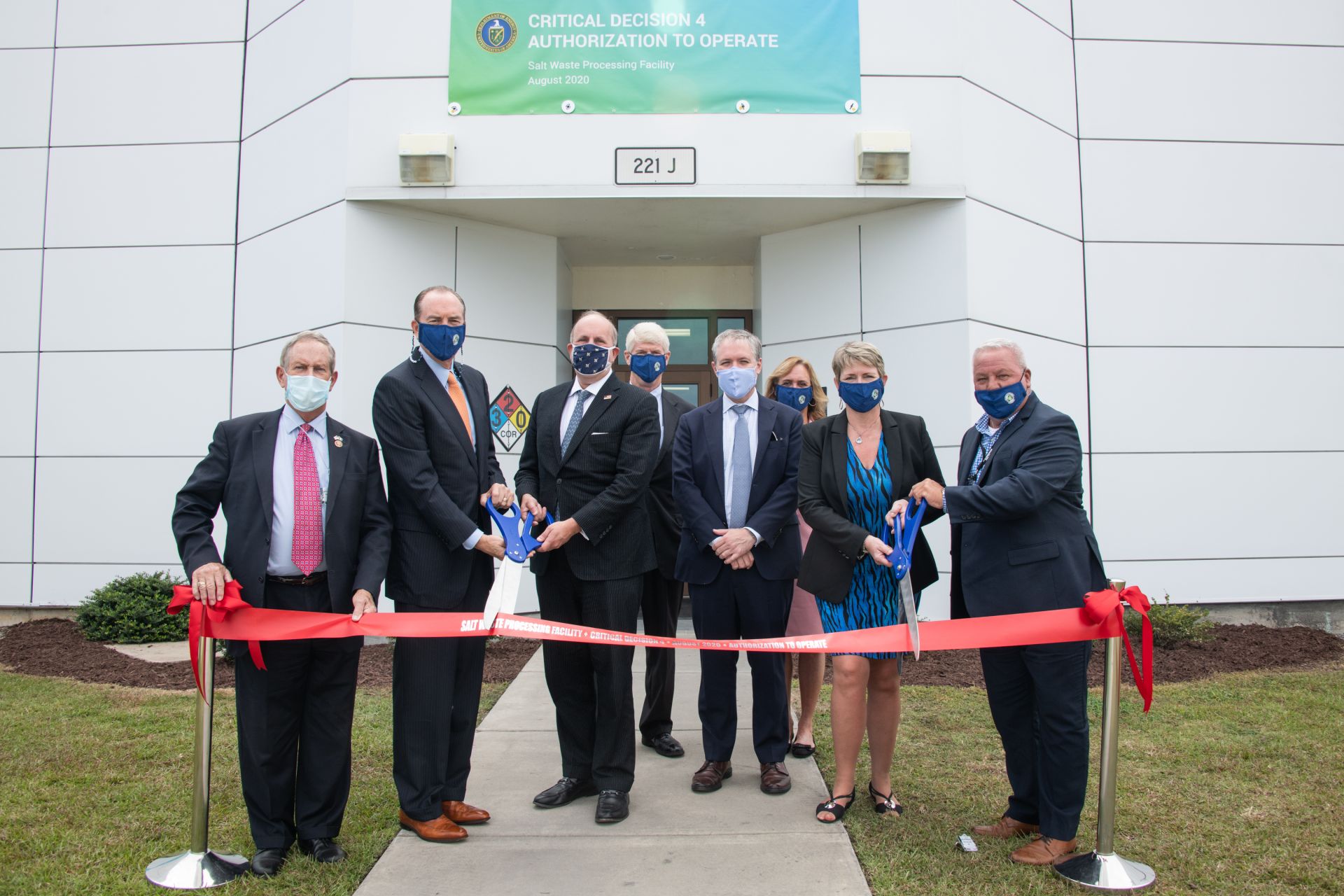
Participants in a ceremonial ribbon-cutting for the Salt Waste Processing Facility at the Savannah River Site included, from left, Rep. Joe Wilson; Parsons chairman and chief executive officer Chuck Harrington; under secretary for science Paul Dabbar; DOE-Savannah River manager Mike Budney; DOE senior advisor William "Ike" White; Parsons president and chief operations officer Carey Smith; SWPF federal project director Pam Marks; and Parsons senior vice president and SWPF project manager Frank Sheppard. Photo: DOE
The launch of the Salt Waste Processing Facility (SWPF) at the Savannah River Site in South Carolina was marked on September 24 with a ceremony attended by the Department of Energy’s undersecretary for science, Paul Dabbar, and senior advisor to the undersecretary for environmental management, William “Ike” White. Also attending the event were Rep. Joe Wilson (R., S.C.) and representatives from the offices of Sens. Lindsey Graham (R., S.C.) and Tim Scott (R., S.C.).
“SWPF is the final piece to what is an impressive and highly successful liquid waste program here,” said Dabbar, who served as the ceremony’s keynote speaker. “Bringing it on line is a tremendous victory, not only for the site, but for the entire cleanup mission.”
The Department of Energy’s Office of Environmental Management issued a final request for proposal (RFP) last week for its Nationwide Low-Level Mixed Low-Level Waste Treatment Services procurement. According to the DOE, the RFP is being issued on a full-and-open, unrestricted basis. The DOE intends to issue one or more basic ordering agreements as a result of this RFP.
The final RFP was can be found on the website of the DOE’s Environmental Management Consolidated Business Center. It also will be posted to the Fedconnect website. The deadline for RFPs is September 30.
On July 16, 1945, the research and development efforts of the nation’s once-secret Manhattan Project were realized when the detonation of the world’s first atomic device occurred in Alamogordo, N.M., more than 200 miles south of Los Alamos, in what was code-named the Trinity Test—a name inspired by the poems of John Donne.
On the 75th anniversary of this landmark event, the Department of Energy’s Office of Environmental Management (EM) is highlighting the cleanup, long-term management, and historical significance of the Manhattan Project sites—Los Alamos, Oak Ridge, Tenn., and Hanford, Wash.—that were conceived, built, and operated in secrecy as they supported weapons development during World War II.